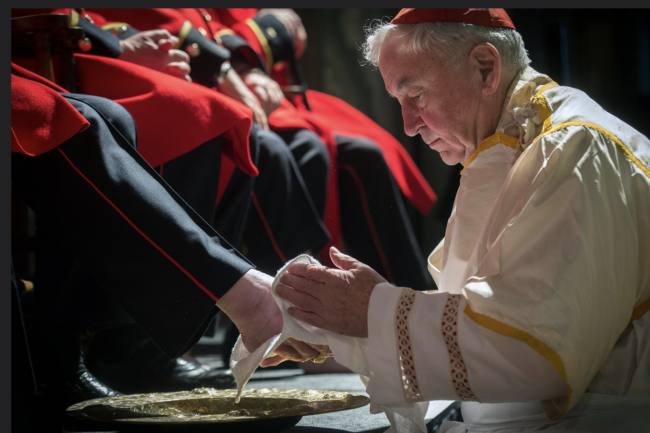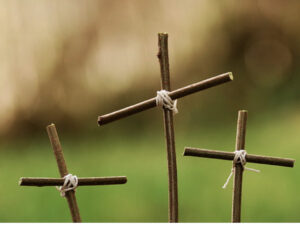
Traditional foot-washing at the Mass of the Lord’s Supper on Maundy Thursday in Westminster Cathedral. Photo by Catholic Church England and Wales, courtesy of Flickr
THURSDAY, APRIL 6; FRIDAY, APRIL 7; and SATURDAY, APRIL 8: Western Christians across the globe entered Holy Week on Palm Sunday, and begin the Easter Triduum—recounting the final days of Jesus’s life and Passion—on Thursday, with Holy (Maundy) Thursday.
HOLY (MAUNDY) THURSDAY: THE LAST SUPPER
The Paschal Triduum is initiated with Maundy Thursday, the fifth day of Holy Week. Alternatively known as Holy Thursday or Covenant Thursday, this day commemorates the Last Supper of Jesus with the Apostles.
Some scholars believe that the name “Maundy Thursday” derived from the Latin mandatum, the first word of the phrase stated by Jesus to describe the purpose for his washing their feet. (“A new commandment I give to unto you, That ye love one another; as I have loved you.”) In some churches, to this day, clergy ceremonially wash the feet of 12 persons as part of Maundy Thursday services. Following the Maundy Thursday service, in most Christian denominations, the altar is “stripped” in solemn fashion in preparation for Good Friday.
Today, even outside of the church building, global traditions for Maundy Thursday are varied and colorful. In the United Kingdom, the Monarch offers Maundy money to worthy elders; in Bulgaria, Easter eggs are colored and homes are prepared for the upcoming holy days. Holy Thursday is a public holiday in many Christian countries.
Did you know? In Bulgaria, Easter eggs must be painted on Maundy Thursday or Holy Saturday in the early morning, before sunrise. The first painted egg must be red.
At the conclusion of Maundy Thursday services, the attitude in the Church becomes somber, dark and mournful. Church bells fall silent until Easter.
GOOD FRIDAY: THE STATIONS OF THE CROSS
While in the Garden of Gethsemane on Thursday night, Christian tradition says that Jesus was located by the Romans—led by Judas Iscariot—and arrested. This led to interrogation, torture and, eventually, to Jesus’ death by the horrific Roman method of crucifixion. In the Catholic Church, Good Friday is a fast day of the deepest solemnity. The altar is bare, vestments are red or black and the cross is venerated.
EXTRA: Joseph Haydn composed “The Seven Last Words of Our Saviour On the Cross,” commissioned in 1785 or 1786 for the Good Friday service at Cádiz Cathedral in Spain. Listen to it here.
In many parishes, the Stations of the Cross recount Jesus’ journey to the site of the crucifixion. In countries such as Malta, Italy, the Philippines and Spain, processions carry statues of the Passion of Christ. In Britain, Australia and Canada, hot cross buns are traditionally consumed on Good Friday (find a recipe here).
HOLY SATURDAY: QUIET AND SOLEMNITY
Holy Saturday, or Black Saturday, ushers in with the darkness of Good Friday, commemorating the day that Jesus’ body lay in the tomb. Traditionally, the altar remains bare or is draped in a simple black cloth. In Catholic parishes, the administration of sacraments is limited. Holy Saturday is a time of suspense, quiet and solemnity, as Christians continue to mourn the death of Jesus Christ. In Catholic tradition, the Blessed Virgin Mary as Our Lady of Sorrows is given the title Our Lady of Solitude, for her grief at the earthly absence of her son, Jesus.
THE EASTER VIGIL—In the evening on Holy Saturday, the Easter Vigil begins. A service that begins in darkness is illuminated, in Christian tradition, with the Light of Christ—the Paschal candle. After prayers, chants and biblical readings, “Gloria” is sung for the first time since Maundy Thursday. The church is flooded with light, statues covered during Passiontide are unveiled and the joy of the Resurrection begins. The Paschal candle, the largest and most exquisite candle in the church, is lit each day throughout the Paschal season.
Note: Eastern Orthodox Christians following the Julian calendar will observe Holy Week one week after the Western Christian Holy Week in 2023, with the Eastern Pascha (Easter) falling on April 16.
